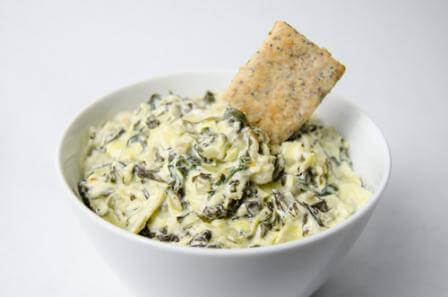How Risky Is Double Dipping?
The practice of double-dipping strikes most people as gross and unsanitary. But does it really increase your risk of infection? Nutrition Diva investigates the science behind the Seinfeld episode.
Monica Reinagel, MS, LD/N, CNS
Listen
How Risky Is Double Dipping?

A few years ago, researcher Paul Dawson of Clemson University decided to find out just how unsanitary the practice of double-dipping is. (Because what is nutrition science for, if not to fact-check sitcoms?)
In his study, Dr. Dawson found that double-dipping does, in fact, transfer bacteria from your mouth to the dip, where it can then be picked up and ingested by the next unwary dipper … even two hours after the original double dip.
As Dr. Dawson expressed it to me in an email, “Sharing a dip with someone that is double dipping is a little like kissing them.”
That may not seem like a big deal if you’re sharing a dip with your loved ones. But if you are going to any big holiday parties this week where dip is being served, you may want to scan the crowd to see if everyone in the room looks like someone you’d be willing to swap a little spit with. If not, you might want to steer clear of the dip.
What’s in Your Mouth?
The fact that double-dipping transfers bacteria from the mouth of the dipper into the dip may strike you as gross but it’s not necessarily dangerous. The human mouth harbors anywhere from 500 to 1,000 different types of bacteria, but most of them are completely harmless. Some are even beneficial.
There are some serious diseases that can be spread through contact with saliva, including pneumonic plague, tuberculosis, and severe acute respiratory syndrome, or SARS—but the chances of running into someone with one of these illnesses at your typical holiday gathering is fairly low.
Sharing a dip with someone that is double dipping is a little like kissing them.
Your chance of running into someone with a cold, on the other hand, is pretty high at this time of year. And while sharing a dip with a double dipper may be equivalent to kissing them, Professor Ron Eccles of Cardiff University points out that kissing a person who has a cold is not nearly as risky as shaking their hand.
How Do Colds Spread?
The common cold is not spread through saliva but in the mucus, usually via the hands. A sick person blows their nose or coughs into their hand and then shakes your hand, or touches a doorknob or subway pole that you then touch. Just having the virus on your hands won’t necessarily make you sick. It’s when you rub your eyes or nose and transfer that virus to YOUR mucus membranes that you generally get sick.
While Dawson’s study has a certain “ew” factor, it seems to me that the germs that might be transferred to communal food from hands are a bigger concern than bacteria that get transferred from mouths. It’s not just about colds, either. Touching food with unclean hands can contiminate it with bacteria that cause food poisoning as well.
Dr. Dawson had his double-dipping volunteers wear sterile gloves, so his study doesn’t shed any light on what might be transferred from hands to dip even when no double dipping is allowed.
If sharing a dip with a double-dipper is akin to kissing them, I asked Dr. Dawson, is sharing a dip with a single-dipper equivalent to shaking their hand?
“Possibly,” he replied, “if they stick part of the cracker in the dip they have touched with their hands. I hadn’t thought of that. Maybe a new study!”
You heard it here first, folks. In the meantime, maybe the safest thing to do—at least during cold and flu season—is to skip the shared dips altogether, unless fondue forks (or sterile gloves) are involved!
Does double-dipping gross you out? Let me know in the comments below or the Nutrition Diva Facebook page.

